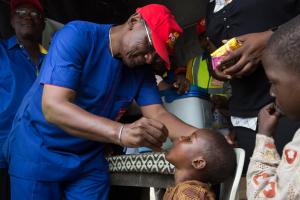African leaders call for urgent action to revitalize routine immunization
Addis Ababa ‒ African heads of state today agreed on key measures to revamp routine immunization across the continent following massive disruptions by the COVID-19 pandemic that stymied childhood vaccination programmes and heightened outbreaks of vaccine-preventable diseases.
A total of 8.4 million children in the African region, compared with 18 million globally, were left out by immunization services in 2021, according to estimates by UNICEF and World Health Organization (WHO). Access to immunization services is even more difficult among poor or marginalized communities or those rendered vulnerable by conflicts or living in fragile settings.
At a high-level event on the side-lines of the 36th Ordinary Session of the African Union (AU) Heads of State and Government in Addis Ababa, the leaders endorsed a declaration on “Building momentum for routine immunization recovery in Africa” which aims to “revitalize the momentum for all populations to have universal access to immunization to reduce mortality, morbidity and disability, and consequently help Member States to achieve their health SDGs and economic and development goals.”
“We believe that it is possible to achieve the national and global immunization targets including eradication and elimination goals. Progress in meeting immunization targets, we believe, is a driver for equitable health outcomes for children, mothers and the population as a whole,” said H.E. Dr Julius Maada Bio, President of Sierra Leone. “We believe as a government that the returns on investment for immunization are very high for our progress towards meeting the SDGs.”
The declaration, at the event convened by the African Union Commission for Health, Humanitarian Affairs and Social Development, the Government of Sierra Leone and World Health Organization (WHO), also called for urgent measures to “address persistent bottlenecks in vaccine and healthcare delivery systems, especially in the poorest, vulnerable and most marginalized communities.”
Across the continent, immunization coverage for many vaccine-preventable diseases is well below the 90‒95% range needed to keep Africa free of these diseases. For instance, in 2021, the median vaccination coverage for measles was 69%; while for diphtheria-tetanus-pertussis coverage was 82.5%; and 81.5% for the third dose of the polio vaccine.
“Recalling the Addis Ababa Declaration on Immunization endorsed by Heads of State at the 28th African Union Summit, Africa’s leaders hold a mandate to secure sustainable financing toward increasing access to immunization, and work with communities to strengthen immunization systems across the continent. We can end vaccine-preventable diseases and save many more lives. This is core to achieving healthy, prosperous communities as premised in the AU Agenda 2063: The Africa We Want,” said H.E. Ambassador Minata Samate Cessouma, the AU Commissioner for Health, Humanitarian Affairs and Social Development.
Today’s declaration urges countries to keep immunization front and centre as they recover from COVID-19 and immunize all children who have not yet been protected. The heads of state also called for countries to act quickly to galvanize support for the last-mile polio eradication efforts and use the lessons learnt from the polio immunization programme to boost routine immunization capacities across the continent.
“Immunization saves lives and is one of the best health investments that money can buy,” said Dr Matshidiso Moeti, WHO Regional Director for Africa. “The COVID-19 pandemic has had a devastating impact on immunization efforts in Africa and has made it critical for us to catch up, recover and get back to normal.”
In Africa vaccine-preventable diseases are responsible for 93% of ongoing infectious disease outbreaks. Currently vaccine-preventable disease outbreaks are ongoing in 31 African countries, with 17 having more than one vaccine-preventable disease outbreak. Without renewed political will and immediate, intensified efforts, it is estimated that immunization coverage will not return to 2019 levels until 2027.
“Children who were missed by immunization services are more likely to also experience limited or no access to health, nutrition, education and other social services,” said Marie-Pierre Poirier, UNICEF Regional Director for West and Central Africa. “With strong political will and increased investment in essential services for children, including immunization, we can accelerate progress towards the Immunization Agenda 2030, the African Union’s Agenda 2063 and the global Sustainable Development Goals 2030 to ensure a healthier, safer and more prosperous Africa for its children and for all.”
The “Building momentum for routine immunization recovery in Africa” declaration also aims to reignite the continent’s commitment to meet the goals of the Immunization Agenda 2030, a new global strategy to address the challenges of immunization and save more than 50 million lives worldwide.
The declaration called on African regional economic communities, health organization and the African Development Bank to support the initiative. It also urged vaccine manufacturers to improve access to doses and the UNICEF and WHO to support countries to monitor progress towards the immunization goals.
Communication Officer
WHO Regional Office for Africa
Email: ridgardn [at] who.int (ridgardn[at]who[dot]int)
Tel: +254 11 289 0666
Media Relations Officer
WHO Regional Office for Africa
Email: dalalm [at] who.int (dalalm[at]who[dot]int)
Tel: +254 703 245 761 (WhatsApp)




